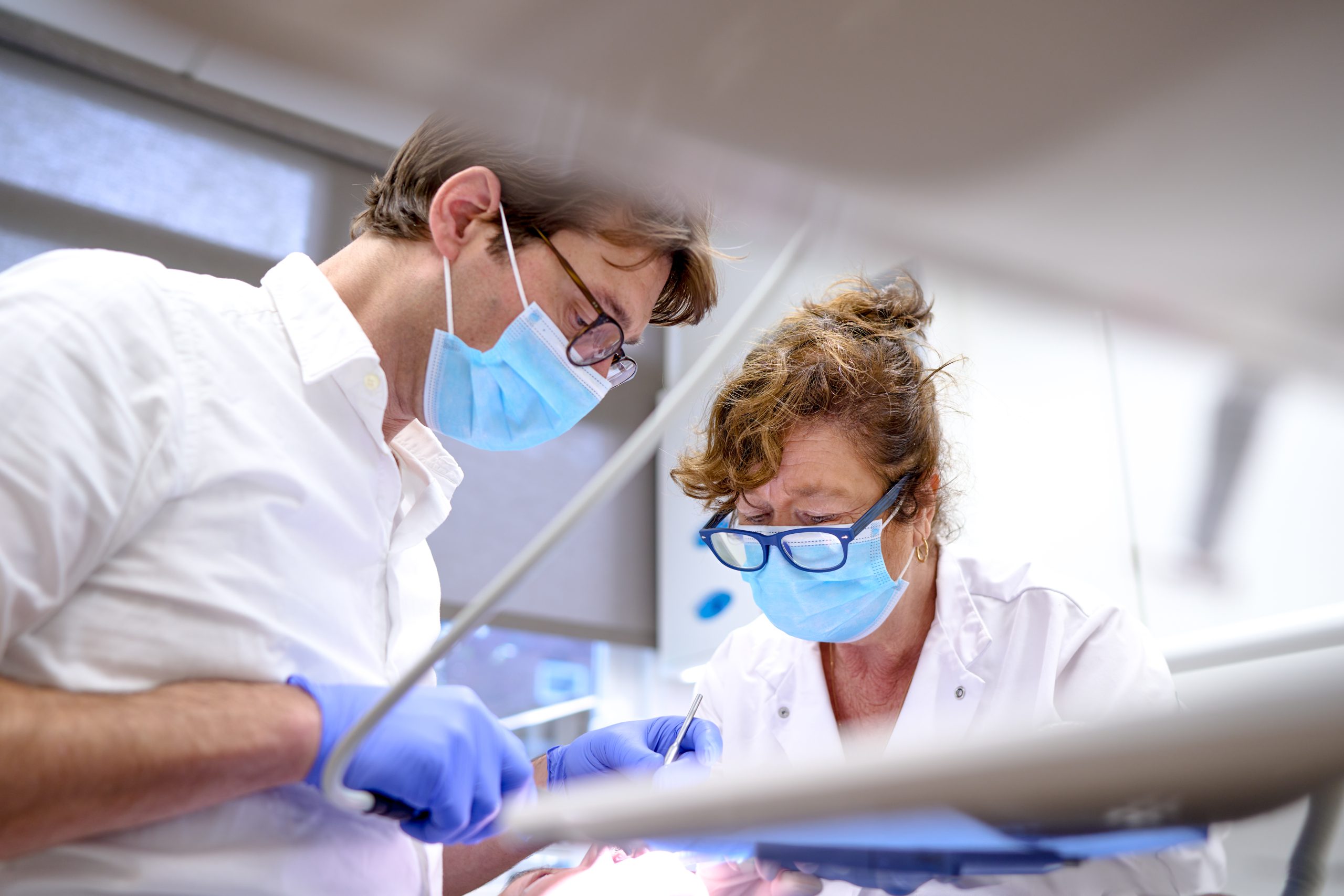Oral Hygiene
Dental Practice Johan HuizingalaanVisiting a dental hygienist is critical for both adults and children. During the appointment, our dental hygienist will review the condition of your teeth, gums and jaw. The dental hygienist will look for the presence of plaque, tartar and eventual gum problems such as bleeding gums or gum infections.
With good oral hygiene and regular checkups by a dentist or oral hygienist, you can ensure that your teeth and mouth remain healthy. At our dental practice, you can count on a professional team of BIG-registered dentists and oral hygienists who specialise in dentistry and implantology. In addition to this qualitative care and attention to your teeth always comes first for us.
Prevent dental problems
We think it is important to prevent dental problems as much as possible. The prevention of problems with your teeth is one of the most important tasks of our team of dentists, dental hygienists and prevention assistants. Nearly all dental problems can be prevented with the help of good dental hygiene. Our dental hygienists are happy to help you with maintaining and improving your overall dental hygiene.

When should I visit a dental hygienist?
We can imagine that you are wondering when you should go to the dental hygienist. Below we list the situations whereby it’s advisable to make an appointment with one of our dental hygienists:
Periodic controls
Firstly, we advise you to plan a checkup with the dental hygienist at least once per year. During the appointment, your teeth, gums and jaw will be looked at, and eventual problems will be discovered at an early stage. During the periodic checkup, our dental hygienists will also advise you about the ways you can keep your teeth and gums healthy.
Problems with gums
A visit to the oral hygienist is of great importance if you have problems with your gums. Gum problems can vary from mild infections to serious dental problems. Gum problems such as infections, bleeding gums, loss of gums and periodontitis, can lead to loss of teeth if they’re not adequately treated. Our dental hygienists are specialised in the discovery and treatment of gum problems.
Bad breath and/or bad taste
Bad breath or bad taste in the mouth can be an indication from a number of dental hygiene problems. A visit to the dental hygienist can help to discover the cause of your bad breath or bad taste and find a suitable treatment.
Bad breath (halitosis) or a bad taste can be caused by a number of things, such as:
- Plaque and tartar that have built up on your teeth or tongue;
- Bacterial infections in your mouth;
- Gum infections or tooth decay;
- Problems with the health of your gastrointestinal tract;
- Food particles that have accumulated in your mouth;
- Certain medicine.
Our dental hygienists can help you find the cause of your bad breath or bad taste in your mouth and find a suitable course of treatment. This can vary from professional cleaning, advice about oral hygiene, adjusting your diet or performing specific treatments such as removal of dental plaque, tartar or tackling bacterial infections.

Loose sitting teeth or molars
Loose sitting teeth or molars can be a sign of serious gum problems or tooth decay. If you have loose sitting teeth or molars, it’s important to make an appointment with a dental hygienist as soon as possible. The oral hygienist can help you by identifying the cause of the loose sitting teeth or molars. This can vary from mild gum infections to gingivitis (serious gum infection) or periodontitis ( gingivitis that has spread to the jawbone).
In the event of an emergency you can contact Lassus Tandartsen outside our opening hours or the dental clinic of the Slotervaart hospital.
Sensitive teeth
Having sensitive teeth can be an annoying problem that causes pain when eating or drinking cold, warm, sweet or sour foods. Our dental hygienists can help you with the identification of the causes of your sensitive teeth. After establishing the cause, the dental hygienist can create a treatment plan to solve the problem.
Do you recognise yourself in some of the situations above? Then it’s advisable to make an appointment with a dental hygienist. Our dental hygienists are ready to help you maintain and improve your dental health.
Treatment dental hygienist
Before our dental hygienists can begin with treatment, they carry out a PPS measurement. PPS stands for Periodic Periodontal Screening and is a screening method whereby your dental hygienist checks if it’s necessary to take further steps. This measurement looks a the depth and spaces between your teeth/molars and gums. These spaces are also called ‘pockets’. The scores of the PPS vary from PPS 1 to PPS 3. Below is an overview of the meaning of the different scores:
PPS 1: With a score of 1, you have pockets from 0-3 mm, and your gums are healthy. Your dental hygienist will advise you how to maintain this score.
PPS 2: A score of 2 is when you have 4-5 mm pockets. There is periodontitis in which the gums and the bone around the teeth are inflamed, and some bone has already broken down. This can be treated with extra dental cleaning and instructions from the dental hygienist, but there’s also a choice for a more extensive investigation (periodontal status) and a more intensive treatment plan.
PPS 3: You receive a PPS score of 3 when your pockets are larger than, or equal to, 6 mm. In this phase, you suffer from bone loss around one or more teeth or molars. With this score, it is therefore often necessary to do a more extensive investigation and to start an intensive treatment plan (paro trajectory).
Rates dental hygienist
These rates are set annually by the Dutch healthcare authority (NZa), commissioned by the Government. This means that prices in every dental practice are the same. Below are several examples of treatments that are often carried out by our dental hygienists.
| M01 | Preventative information and/or instruction, per five minutes | €17,01 |
| M03 | Dental cleaning, per five minutes | €17,01 |
| M30 | Treatment of sensitive tooth necks (preventative) administration of medication (per element) | €7.59 |
| M40 | Fluoride treatment | €18,97 |
| T012 | Investigation of gums with periodontal status | €220,01 |
Reimbursement health insurance
In the Netherlands, every visit to a dental hygienist is reimbursed up to the age of 18. From your 18th year, you only have the right to reimbursement when you have additional (dental)insurance. The reimbursement amount varies depending on your health insurer, the terms of the policy and the type of treatment you receive. It is therefore advisable to consult or contact your insurer to determine how much reimbursement you can expect for your visit to the dental hygienist.
Dental Practice Amsterdam Nieuw-west
Our dental hygienists are established in our practice in Amsterdam Nieuw-West, where we serve many clients in the area. Together with our dentists, our dental hygienists help you by maintaining your oral health and preventing and treating dental health problems. We strive to keep your teeth healthy and strong so that you can enjoy a beautiful and healthy smile. Moreover at Tandartspraktijk Johan Huizingalaan, we have long and flexible opening hoursd. You are welcome to make appointments during some evenings during the weekend and even on Saturdays.
Are you looking for an English-speaking dentist in Amsterdam? You are very welcome in our practice! Registering can easily be done via our website. Do you have questions about our dental practice or how we work? You are very welcome in our practice! Registering can be easily done via our website. We’ll be happy to help you.
Frequently asked questions about periodic check-ups
What causes inflamed gums?
Gum infections are caused by bacteria which accumulate in the mouth. This bacteria forms a layer on your teeth and gums that is known as plaque. If plaque isn’t regularly removed it can harden. This is called tartar. Tartar can irritate gums and cause infections.
Another important factor that contributes to gum infections is poor dental hygiene. If you don’t brush your teeth regularly and clean between them with interdental brushes or dental floss, plaque and tartar can build up and cause inflammation. It’s also worth noting that some people are at greater risk of gum disease, such as smokers, people with diabetes, or people with sensitive immune systems.
Which foods are not good for my dental health?
Certain types of food are not good for the health of your teeth. These include:
- Sugary foodstuffs such as sweets, cookies, juices and cakes. These foodstuffs can contribute to the development of plaque and cavities.
- Sour foodstuffs such as citrus fruit, apples, tomatoes and vinegar. These foodstuffs can have a negative effect on your tooth enamel and cause cavities.
- Sticky foodstuffs such as dried fruit or sweets. Due to their stickiness, these foodstuffs stay longer in your mouth, which makes it easier for bacteria to stick to your teeth and gums. This can cause cavities
- Drinks such as coffee, tea, red wine and cola, can cause the discoloration of teeth.
It is important to eat and drink these foods in moderation and to rinse your mouth well after eating or drinking.
Is an electric toothbrush better than a manual toothbrush?
Studies have shown that electric and sonic toothbrushes are generally more efficient at cleaning teeth and gums than manual toothbrushes. These toothbrushes provide faster and more thorough cleaning because the brush head automatically rotates (electric) or moves back and forth (sonic). This helps with the efficient removal of plaque and tartar, and can also contribute to better oral hygiene and a lower risk of cavities and gum problems.
Is a referral required in order to see a dental hygienist?
No, it’s not necessary to have a referral from a dentist in order to see a dental hygienist. However, if one of our dentists identifies a problem, he/she can of course advise you to go to a dental hygienist. In view of the fact that Tandartspraktijk Johan Huizingalaan has a dental hygienist ‘in house’ we can get you an appointment quickly.
How often do you recommend going to the dental hygienist?
We advise that you have a twice-yearly combined appointment with a dentist and an oral hygienist. The Dentists will check if there are any problems with your teeth, and the dental hygienist will professionally clean your teeth and gums. This helps to remove plaque and tartar and the early detection and treatment of any problems with your gums. In addition, this allows the dental hygienist to advise you on your oral hygiene routine.
Depending on your individual situation, the exact frequency of appointments can of course differ. For example, if you have a higher risk of gum problems, or if you never suffer from anything. You should therefore always consult your dentist or dental hygienist for advice on the frequency with which you should make an appointment.